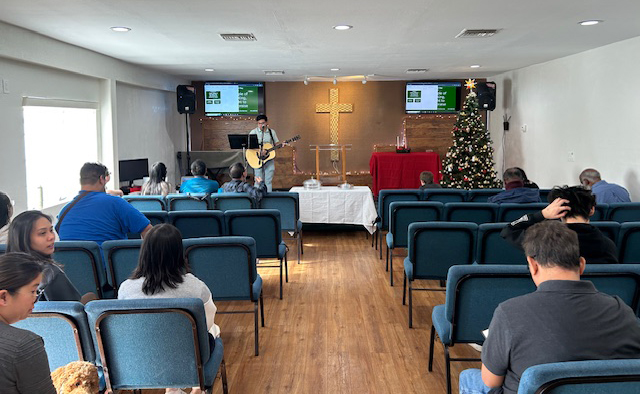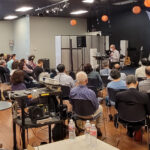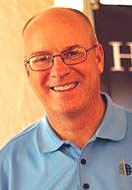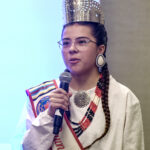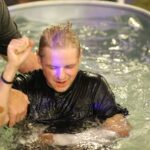
COVINA, Calif. – First Southern Baptist Church here consists of a Chinese congregation and a multicultural English-language congregation; the building purchased from the association in 1991 with name unchanged because “we appreciate the conservative values of the Southern Baptist tradition and its emphasis on the Bible. That is why, to this day, we remain committed to these principles,” Pastor Jack Chen says.
Both groups meet at 11 a.m. Sundays. The Chinese congregation meets in the worship center; the English congregation meets in the fellowship hall.

Taiwan-born Chih-Chueh “Jack” Chen has been senior pastor of the church since 2008, and part of the church leadership for 30 years. Palestinian-British Dean Eltiti has been pastor of the English-speaking congregation since 2007.
“I’ve been getting more involved with Southern Baptists,” Eltiti told Baptist Press. He is a part of the Asian NextGen Pastors Network, among others. “We want to encourage English-language pastors, to strengthen all of us, since we lead in this unique context with unique challenges.”
English-language churches that are part of an ethnic church are both an independent congregation and one that is part of a another. An English-language pastor is both the lead pastor of one congregation, and a supporting pastor of another.
“There can be a lot of tension between the Asian and the English pastor,” Eltiti said. “You want to be one church, but it’s like two in one.”
Eltiti said he has a great relationship with Senior Pastor Chen, and he wants other second-generation pastors to have the same.
“We deeply value and cherish our English congregation,” Chen told Baptist Press. “Initially, the children in the English congregation were those of our Chinese congregation members. As they grew up, they moved out and got married. Today, many of the children in the English congregation are no longer our own, but we thank God that, under the leadership of Pastor Dean, they have found stability in the church and continue to learn the Bible.
“The children in the English congregation are like our own, and we hope to see their growth and development, attracting more local children to join our church,” the Chinese-language pastor continued. “We aspire to support and encourage one another so that our church will continue to grow and bring joy to God.”
Eltiti wrote an essay, which is posted at the bottom of this article, to help smooth the way to good relationships between Asian pastors and the English-speaking pastors that are part of the church.
By the start of the 21st century and even earlier, the children of immigrants who began arriving in the 1970s became Americanized in language and culture. English-language “departments” were started (for those who preferred to speak the English they used at work and school) in some of the larger churches that in most cases grew, as children became adults, into separate congregations to include those more comfortable with English.
The often still language-deficient Asian pastor had to trust that the English-language pastor was not leading his congregation doctrinally astray. At the same time, the Asian pastor – nearly always an immigrant himself – needed to be alert to cultural changes even within the Asian community, so he could continue to lead effectively.
“Trust is the most important asset in pastoral ministry,” Eltiti writes in his essay. “It’s so difficult to build trust back up again when it is broken.” He was referring to trust between Asian and English-speaking pastors, and between English-speaking pastors and both the Asian and American congregations.
Trust was No. 7 in a list of 10 ways for NextGen English-speaking pastors to thrive.
A “high view of Scripture and the church” was No. 1. Cultivating a genuine love for Asian as well as American members came next, followed by establishing a common bond as a way of building relationships.
Servant leadership was No. 4. Theological triage – primary issues essential for salvation, secondary ones that affect the health of the church, and tertiary matters of personal opinion – was followed by patience. Be a good model, be adaptable, and join with other NextGen pastors for support in building up the Kingdom of God; these round out the 10 steps to successfully navigate ministry as an English-language pastor in an Asian church.
“I have found it so helpful and rewarding to have partners on the path to building up a healthy church,” Eltiti said. “I have been enriched by having strong connections with my fellow brother pastors.”
Karen L. Willoughby is a national correspondent with Baptist Press.
10 steps to successfully navigating the Chinese Heritage Church
Dean Eltiti – Covina First Southern Baptist Church.
I began serving as the English Pastor almost seven years ago. In doing so I carried on the baton faithfully carried by my predecessor Tori Swingrover, who passed away unexpectedly in May of the previous year. Prior to that the Lord was leading me to ministry in an Asian heritage church through many guest preaching opportunities at various churches in Los Angeles County. It is my joy in this article to share ten steps with you from my own experience to successfully navigating ministry in the Chinese Heritage Church (CHC). It is my prayer that this will help your church continue growing in becoming a biblically healthy church.
- A healthy church starts with a high view of Scripture and the Church. I was blessed to have this instilled in me by my home church in England prior to moving to Los Angeles for seminary, where this conviction was built up even further. My predecessor also held to this conviction and instilled this priority in the congregation, which made it easier for me to continue building upon this foundation. I believe that expository preaching is a natural overflow of this high view of Scripture and the church, as we want to faithfully and accurately know the whole counsel of God’s Word and let God set the agenda for our church’s preaching.
- Cultivate a genuine love for everyone in the church, regardless of which language congregation they attend. Seek out the best in your fellow believers and encourage them in these traits so that you earn the right to challenge them to grow in their weaker spots. In particular, find things to admire in your church’s leadership team which will go a long way to establishing good relationships with those whom you will work with regularly to build up the health of the church. Exuberate the joy of the Lord, even to those that you are barely able to communicate with through speech, by smiling a lot and using your body language to show courtesy, appreciation and humility.
- Make full use of your emotional intelligence to build up relationships with other people by finding points of connection with them. One way in which I have done this is by observing the similar values between the mindsets of British & Chinese believers, even though we are all living in the United States which may not value these things as much. These shared values include the importance of tradition, a great education, being thrifty with our resources, sacrificial giving to the church and fellow believers, and the enduring value of singing hymns. This establishes a common bond between the congregations as we are working towards building up the kingdom of God based upon shared values.
- Walk in the way of servant leadership. Go out of your way to serve other people, especially in the early months and years of your ministry. Be willing to do mundane things in the church which may lie far outside of the usual job descriptions for pastors in the United States. CHCs particularly value pastors who are good all-rounders with a highly varied skill-set, including being handy with a screwdriver. Have the mindset of “what can I give to the church” rather than merely “what can the church do for me,” which is the way the Lord directs us to shepherd His sheep.
- Practice theological triage. This term was coined by Southern Baptist Theological Seminary President Al Mohler and involves distinguishing between primary issues which are essential for salvation; secondary which involve the health and practice of the church; and tertiary which are not enough to justify separation or division. Establish priorities early on in your ministry by looking at the big picture of your church as it is now and where you would like to take it on the journey towards greater health. This will serve you well over the coming years so that your ministry has vision and direction so that you can pursue meaningful goals.
- Be patient. Enter your ministry with a commitment for the long haul. Building up healthy churches is not an easy task and shouldn’t be rushed. It will take time to build up relationships with everyone in the church and to win their trust. You can then gradually build people up into being more and more committed followers of Christ. I’ve found that a good way to practice patience even as a young “go-getting” pastor is to set out a vision for the future and then set out tasks which you can gradually implement over the coming years. Don’t forget to be flexible in your plans as the Lord leads your church.
- Build up a high degree of trust with the congregation. Trust is your most important asset in pastoral ministry and must be managed well. It’s so difficult to build trust back up again once it has been broken. A large part of trust is established by who you are as a person while another part is determined by your competence as a pastor. I prioritized building up trust in the church from the outset of my ministry and was so glad that I did as the Covid lockdowns began less than two years into my role. Possessing this trust was a huge advantage as we led the church into unchartered territory, largely working from home at a physical distance to the church.
- Set out to be a good model of ministry for all language congregations within the church. Model a ministry which puts people first rather than programs or any other thing. Look for opportunities that will result in win-wins for all the congregations, so that your church can have a unified approach to the ministry within the wider community. Recognize what the CHC can bring to the Southern Baptists writ large. I’ve especially come to see that the CHC can make an impactful contribution to the wider church through its family values and strong community which are often lacking in the individualized culture for which the United States is famous.
- Be adaptable. It’s important to have a vision and goals for the church, but we must hold them loosely so that we can respond well when things may not go as we have planned. Be comfortable with building up new ministries though “trial & error,” or what I prefer calling it “trial and improvement.” This has been especially true with the outreach events which we have tried out and improved over the years so that now we are finding them to be more and more intentional in reaching out to unbelievers in our neighborhoods.
- Lastly but certainly not least, build up strong connections with other pastors. I have found it so helpful and rewarding to have partners on the path to building up a healthy church. I have been enriched by having strong connections with my fellow brother pastors through three groups I am privileged to be a member of, with each meeting at least monthly. It’s vital to know that you are not alone in the challenging work of ministry but are part of an army of shepherds all seeking to build up the kingdom of God!
